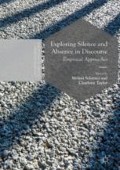Abstract
This chapter highlights and illustrates a software-based method devised to assist with the detection of straw man arguments. It is intended for use by undergraduates on modules where enhancing critical thinking is a key focus. This method helps establish efficient critical purchase on online arguments in the public sphere, particularly where students are not knowledgeable about the argument’s topic or the standpoint it criticises. It does this by employing simple-to-use digital text analysis software to explore the content of weblinks inserted in an online public sphere argument. Weblinking is a common practice to direct the reader to the text(s) being criticised in an argument. But, weblink content is often long and may not have been checked carefully by the argument’s author. What if a weblink contains material which conflicts with the author’s framing of the standpoint they are criticising? If this framing is found to be unstable because of relevant absences, then the argument’s credibility is in doubt. It is a ‘straw man’. A key pedagogical advantage of focusing on weblink content is the student can attain a critical grip on a public sphere argument with an unfamiliar topic in a targeted, and thus non-open-ended manner while simultaneously increasing their knowledge of a new domain of debate. A key methodological advantage of this software-based data extraction is that rigour is augmented since arbitrariness in both the exploration of the standpoint data and the evaluation of the straw man status of an argument are considerably reduced.
Notes
- 1.
A free 30-day trial is available for ‘Sketchengine’. See https://www.sketchengine.co.uk [accessed March 2017].
- 2.
- 3.
The parliamentary debate also uses the alternative acronym, ‘ISIL’ (‘Islamic State of Iraq and the Levant’). Salafism is an austere branch of Sunni Islam.
- 4.
- 5.
An account of Monbiot’s activism: http://www.monbiot.com/about/ [accessed March 2017].
- 6.
‘Plain text’ is the default format for digital text analysis, i.e., not formatted text.
- 7.
Lexical words carry the main information content of a text and belong to four classes: nouns (‘dictionary’); lexical verbs (‘walk’); adjectives (‘hot’); adverbs (‘beautifully’).
- 8.
Lemmas are conventionally represented in small capitals.
- 9.
Grammatical words are non-content-based words such as determiners (‘the’), conjunctions (‘if’) prepositions ‘(in’), pronouns (‘he’) and auxiliary verbs (‘is’ in ‘he is keeping well’).
- 10.
I used the following stopword list: https://cup.sketchengine.co.uk/stopwords/english/ [accessed March 2017].
- 11.
- 12.
http://www.monbiot.com/2014/09/30/bomb-everyone/ [accessed March 2017].
- 13.
I deleted irrelevant metadata, e.g. the time and date of the debate.
References
Aikin, S., & Casey, J. (2011). Straw men, weak men, and hollow men. Argumentation, 25(1), 87–105.
Bowell, T., & Kemp, G. (2015). Critical thinking (4th ed.). Abingdon, UK: Routledge.
Carter, R., & Nash, W. (1990). Seeing through language. Oxford: Blackwell.
de Beaugrande, R., & Dressler, W. (1981). Introduction to text linguistics. London: Longman.
Entman, R. M. (1993). Framing: Toward clarification of a fractured paradigm. Journal of Communication, 43(4), 51–58.
Fowler, R. (1996). Linguistic criticism (2nd ed.). Oxford: Oxford University Press.
Kilgarriff, A., Baisa, V., Bušta, J., Jakubíček, M., Kovář, V., Michelfeit, J., et al. (2014). The sketch engine: Ten years on. Lexicography, 1(1), 7–36.
O’Halloran, K. A. (2017). Posthumanism and deconstructing arguments: Corpora and digitally-driven critical analysis. London: Routledge.
Pariser, E. (2011). The Filter Bubble: What the Internet is hiding from You. London: Penguin.
Partington, A. (2014). Mind the gaps: The role of corpus linguistics in researching absences. International Journal of Corpus Linguistics, 19(1), 118–146.
Talisse, R., & Aikin, S. (2006). Two forms of the Straw man. Argumentation, 20(3), 345–352.
Wenzel, J. (1990). Three Perspectives on Argument. In R. Trapp & J. Schutz (Eds.), Perspectives on argumentation: Essays in Honour of Wayne Brockriede (pp. 9–16). Prospect Heights, IL: Waveland Press.
Widdowson, H. G. (2007). Discourse analysis. Oxford: Oxford University Press.
Acknowledgements
I am grateful to The Guardian for permission to reproduce ‘Why stop at Isis when we could bomb the whole Muslim world?’ published on 30 September 2014.
Author information
Authors and Affiliations
Editor information
Editors and Affiliations
Rights and permissions
Copyright information
© 2018 The Author(s)
About this chapter
Cite this chapter
O’Halloran, K. (2018). Critically Illuminating Relevant Absences in Public Sphere Arguments via Digital Mining of Their Weblinks: A Software-based Pedagogy. In: Schröter, M., Taylor, C. (eds) Exploring Silence and Absence in Discourse. Postdisciplinary Studies in Discourse. Palgrave Macmillan, Cham. https://doi.org/10.1007/978-3-319-64580-3_6
Download citation
DOI: https://doi.org/10.1007/978-3-319-64580-3_6
Published:
Publisher Name: Palgrave Macmillan, Cham
Print ISBN: 978-3-319-64579-7
Online ISBN: 978-3-319-64580-3
eBook Packages: Social SciencesSocial Sciences (R0)

